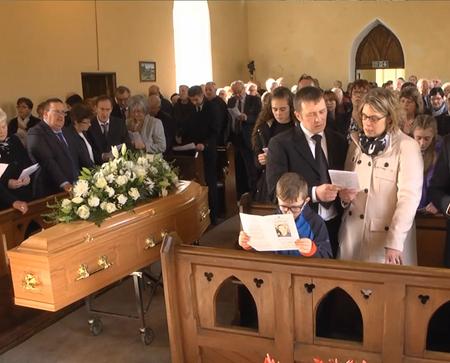The Funeral Service
The Funeral Service

It has been correctly stated that we are only a breath away from death. Newspaper obituaries and funerals are a constant reminder of death. To be reminded of the reality of death is not a pleasant thought, yet funeral services occur daily throughout the land.
Just as we are surrounded by death, so also we see cultural changes around us in the way that death is treated. Many of those changes are reflected in the way funeral services are conducted. There is a recent development at funeral called a “Celebration of Living” in which the deceased is given all kinds of accolades, as if the demised can somehow hear what is being said about them. In many of these funerals, it seems as if the minister is trying to preach the individual into heaven. I recall one funeral service in which the deceased was an elderly, active mother, grandmother, and great-grandmother. During her lifetime she had made many different craft items including afghans, quilts, needlepoint, and a huge crocheted rendition of the Lord’s Prayer. All of these had been strategically placed around the pulpit area of the sanctuary. It almost looked as if there was going to be an auction after the funeral.
No doubt many readers have been to so-called Christian funerals where the name of Christ was never mentioned. How sad when a person has gone to church all his life and all the minister can talk about is “Joe never went anywhere without his cigar” or “George played one mean game of poker.”
It is not our intention to impugn or besmirch the reputation of the dead. Rather, we wish to call upon Ministers of the Word to be exactly that – Ministers of the Word. Funeral services are not for the dead. They are for the living. The living are to hear words from the Holy Scriptures. The minister’s task at a funeral is three-fold: He is to comfort the grieving; reassure the believer; and warn the unbeliever. These can only be done by faithfully proclaiming the Word of God. It brings no comfort whatsoever to the grieving family to list the accomplishments of the deceased. They would rather hear about the accomplishment of the One who came to save His people from their sin. They would rather hear about the grace of God shown to a person who they know was a sinner just like them, and who, by the grace of God, is now in heaven because of Christ.
It offers no assurance to the believer to be reminded about the past of a friend whom they have known for many more years than the minister presiding over the funeral. Believers need to be reminded that heir hope, too, rests in the glorious resurrection of Jesus Christ. That because of Christ’s once for all sacrifice on the cross, we have the forgiveness of sins and the promise of eternal life. They need to hear again how death is not the enemy of those who trust in Jesus Christ. Rather, death is a putting away of our sinful bodies and entering into the eternal city prepared for us by our glorious Savior.
And finally, the minister who does not mention Christ in his message is derelict of his responsibility to the unbeliever. Many people who come to pay their last respects (both family and friends) to the deceased may never darken the door of a church on the Lord’s Day. How necessary it is for the minister to lay before the listeners the fact that death comes to all and that all must turn away from sin and look to Christ for their salvation.

I know a young minister who conducted the funeral service of a homosexual man who died from AIDS. As difficult as it was, this pastor spoke of the need for repentance, turning from sin, and coming to Christ. He tells of how during the message several of those attending the service got up and walked out.
The Word of God is a two-edged sword. The calling of the minister is to wield that sword so that those hearing are without excuse. And also, so that the seed may be planted. No unbeliever will ever come to Christ hearing how Uncle Charlie loved his garden or how Grandma made the best apple pie in the county. They need to hear that the dear Christian is in heaven not by her own works, but because she belonged body and soul, in life and death, to her faithful Savior, Jesus Christ.

Add new comment